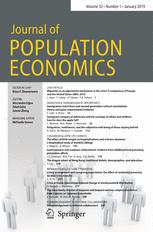Issue 2019/1 of the Journal of Population Economics is published: Please see for the Table of Content: Volume 32, Issue 1, January 2019
The Lead Article is about:
Migration as an adjustment mechanism in the crisis? A comparison of Europe and the United States 2006–2016
Authors: Julia Jauer, Thomas Liebig, John P. Martin, Patrick A. Puhani
Abstract
” We estimate whether migration can be an equilibrating force in the labour market by comparing pre- and post-crisis migration movements at the regional level in both Europe and the United States, and their association with asymmetric labour market shocks. Based on fixed-effects regressions using regional panel data, we find that Europe’s migratory response to unemployment shocks was almost identical to that recorded in the United States after the crisis. Our estimates suggest that, if all measured population changes in Europe were due to migration for employment purposes—i.e. an upper-bound estimate—up to about a quarter of the asymmetric labour market shock would be absorbed by migration within a year. However, in Europe and especially in the Eurozone, the reaction to a very large extent stems from migration of recent EU accession country citizens as well as of third-country nationals.”
Read also open access for a short period:
Yoo-Mi Chin & Nicholas Wilson, Disease risk and fertility: evidence from the HIV/AIDS pandemic, Journal of Population Economics, 31 (2018), 429–451.
Kuznets Prize Winner 2019.
The paper is freely downloadable for a short period. The Award Study shows that a rise in the disease risk increases the total fertility rate and the number of surviving children, a finding which has important policy implications.
Ends;


